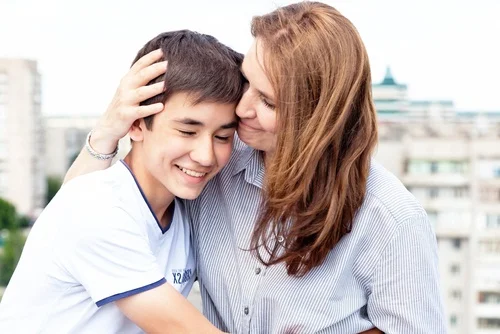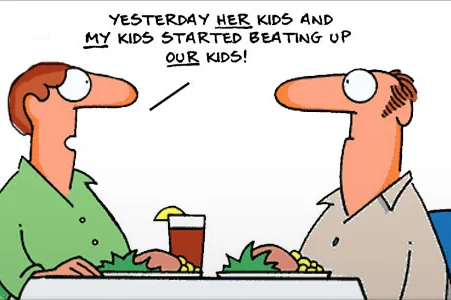+1 845 259 2974 (11 a.m to 7 p.m CST)
How to Say “No” To Teens without Hurting Their Feelings

Raising a teenager is hard. It is like building a tricky model with confusing instructions. It can be confusing and frustrating. You worry you will finish and it will not be right. One of the hardest parts is saying "no." This small word can feel very heavy. You see your child's happy face. They are excited about a party, a game, or a trip with friends. Your heart feels sad. You know what will happen next. You know they will think you are the "fun spoiler" or the "mean parent."
It is a really awful feeling. It can make you feel bad for a long time.
But you must remember this: saying "no" is not being mean. It is not about control. It is about love. It is like a safety fence. It lets them see the view, but it stops them from falling. The goal is not to never say "no." The goal is to say it in a way that does not break their heart. You want to keep your relationship strong.
So, how do you do it? How do you handle this difficult situation without causing a big fight?
First, Understand Why You Are Saying No
Before your teen asks for something, remember why rules are important. You are not just trying to stop their fun.
Their brains are still growing. The part that makes smart choices is not finished yet. It is like they have a fast car engine but weak brakes. When they want something that seems like a bad idea, their brain is shouting "FUN! FRIENDS!" The quiet voice that says "be careful" is hard for them to hear. Your "no" is you being that careful voice for them. You are their brakes.
Also, rules make teens feel safe. The world is a big and scary place. Social media makes it even harder. When they test your rules, they are checking to see if you are still in charge. They need to know someone is strong enough to keep them safe. They will not say it, but your consistency makes them feel secure.
What to Say (And What Not to Say)
You know why you need to say no. But what words should you use when your teen is asking for something?
Stop saying "Because I said so." Get rid of that phrase. It starts arguments. It tells your teen that their feelings are not important. Instead, try "No, because..." This shows you respect them enough to give a reason.
Do not say: "No, you can't go. Because I said so."
Try saying: "No, you cannot go to that party. I heard there will be no adults there. That makes me worried for your safety."
Do you see the difference? The first one starts a fight. The second one starts a conversation. It comes from love, not anger.
Another powerful trick is to understand their feelings before you say "no."
If they want expensive shoes: "Those shoes are very cool. I understand why you want them. It must be frustrating to not have them."
If they want to stay out late: "I know that concert sounds amazing. It is too bad it is on a school night. I feel bad that I have to say no."
When you do this, you are on their team. You show you understand. The "no" that comes next feels like a shared problem, not a punishment.
Another good idea is to say "No, for now" or "Yes, but." A simple "no" ends the talk. A conditional "yes" keeps it going.
For the expensive shoes: "I cannot buy those for you right now. They cost too much. But, I can help you pay for some of it. We can make a plan for you to earn the rest."
For the late night: "You cannot stay out until 2 AM. But, I can pick you up at 11 PM. You can still go for a little while."
This teaches them about compromise and solving problems. You are working together.
Also, choose what is important to fight about. If you say no to everything, their music, their clothes, their messy room, they will stop listening. You will just be background noise. Save your firm "no" for important things like their safety and health. If you do not argue about small things, your big "no" will have more power.
Handling the Reaction
You said no perfectly. You were kind and understood their feelings. But... they ran to their room and slammed the door. What do you do now?
Do not follow them. When they are very angry, they cannot listen. Their thinking brain is not working. Give them space. You can say, "I see you are upset. Let's take a break and talk later." Then, walk away. Make a drink. Take a deep breath. This is difficult, but it is very important.
After things are calm—maybe in an hour or the next day—try to reconnect. This does not mean you change your rule. It means you show them you still love them. Ask a simple question like, "Do you want a snack?" or "Shall we watch a film?" This shows them your love is bigger than any argument. This is a very important lesson: a disagreement does not mean you stop caring.
When they are ready to talk, just listen. Do not talk over them. Do not get angry. Do not try to solve the problem. Let them say everything they feel. Often, they do not want you to fix it. They just want to feel heard. When you listen, you tell them their feelings matter to you.
The Most Important Thing
This job is hard. You will not always get a "thank you." Some days you will feel like you are doing everything wrong. You will look at their angry face and miss the little child who thought you were perfect.
But you are not raising a child. You are raising a future adult. Every kind "no" you say is like putting money in a savings account for them. It teaches them how to be strong. It teaches them that sometimes life is disappointing, and that is okay.
Your job is not to be their best friend. Your job is to be their parent. Friends will change, but you will always be there. One day, they will be in a tough spot. They will remember your words. They might even call you and say, "Remember when you would not let me do that? Thank you."
In that moment, every slammed door and every tear will feel worth it. You are building a good person. It is the most important, difficult, and amazing job in the world. So take a deep breath. Be brave. Say what needs to be said. Always say it with love. You can do this.























